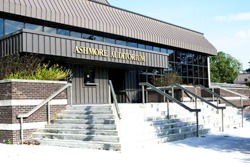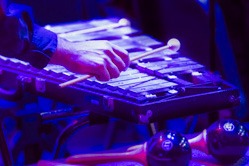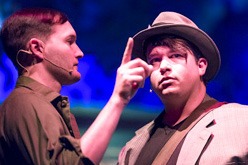mu·sic
noun
-
-
- a : the science or art of ordering tones or sounds in succession, in combination, and in temporal relationships to produce a composition having unity and continuity
b : vocal, instrumental, or mechanical sounds having rhythm, melody, or harmony - Associate In Arts (AA) – University Transfer Program at Pensacola State College
- a : the science or art of ordering tones or sounds in succession, in combination, and in temporal relationships to produce a composition having unity and continuity
-
Introduction to the Music Program
No matter what area of music a student is considering for their career, the student must have a principal performing area. The faculty provides principals in piano, organ, voice, strings, woodwinds, brass, classical guitar, and percussion as well as music theory and other related courses.
Pensacola State provides two years of college work acceptable for transfer to any college or university including both general education and music. Pensacola State music students have transferred with ease and success to universities such as West Florida, the FSU School of Music, South Florida, Southern Mississippi, Louisiana State, Loyola, Stetson, Samford, and several seminaries. Those graduates are currently working with success in public school music at all levels, as directors of music, as college teachers in applied music, music theory, and music history, in composition, in music therapy, and as professional performers. Several are also teaching in their own private studios.
The faculty believes that serious students should enjoy their two years at Pensacola State. By selecting a music career, the student has selected a career which will provide a fulfilling and rewarding future. However, music majors have demands made on them that will not be found in other careers. More credit hours are required in their college program, more contact hours are spent in class each term, and numerous hours of individual practice are expected. These demands prepare students for an equally demanding career.
Students entering this program will need to make an appointment with the Department Head of Performing Arts or be present at one of the formal auditions held by the department. Before beginning a major in music, the student is required to audition on a principal instrument. This audition is not intended to eliminate a student, but merely to advise. The student also is required to take a brief written test in music theory. Again, this test is not designed to eliminate a student but to advise whether or not a student should proceed directly to Music Theory or first take Fundamentals of Music. For more information, contact the Performing Arts Department Head.
AUDITIONS: All entering music majors must be auditioned in their principal instrument or voice. The purpose of the audition is to determine the level of performance the student has attained prior to entering our music program. In some cases, a student with excellent potential, but little formal training, may be deficient in certain areas of performance. The student will need to eliminate this deficiency before attempting freshman-level applied music (1311 series). After consultation with their teacher and the department head, the student may be placed in the 1211 series, or even in the 1311 series for non-credit, so as to reach major level without the risk of failure. We are lenient in accepting music majors as freshmen, but we are concerned that students perform at the proper level when leaving PJC. Students must be able to enter upper-level institutions at the proper level and be successful. Students should prepare something to perform at the audition. It may be a solo, etude or exercise. Selected music should demonstrate all the student’s abilities. It need not be memorized.
MUSIC THEORY PLACEMENT EXAM: This exam will be given to identify the student’s knowledge of music fundamentals prior to entering freshman theory. Those lacking proficiency in music fundamentals will be required to take MUT 1001 in Term III-B or concurrently with the regular theory course in the fall. This is done to ensure that the student succeeds by having the proper background in fundamentals before entering music theory.
Music Class Offerings
| MUT 1111 | Music Theory I | Introduces the fundamentals of musicianship approached through visual and aural analysis, notation, scales and intervals, and formation of triads, leading to a study of harmony and nonharmonicism. |
| MUT 1112 | Music Theory II | A continuation of MUT1111 Music Theory I. Emphasizes the study of modulation of closely related keys and chords of the seventh, and musical forms. |
| MUT 2116 | Music Theory III | A continuation of MUT1112 Music Theory II. The study of modulation to remote keys, binary and ternary form, and formation and use of diminished and diatonic seventh, dominant and ninth, eleventh and thirteenth, and borrowed chords. |
| MUT 2117 | Music Theory IV | A continuation of MUT2116 Music Theory III. A brief introduction to two part counterpoint, instrumentation, and modern composition with emphasis on completing the study of composition of the 18th and 19th centuries. Includes analysis of music of the 19th and 20th centuries. |
| MUT 1241L | Ear Training and Sightsinging I | An introductory course designed to help the student develop abilities to recognize, write, and reproduce music seen and heard. Emphasizes simple major and minor scales, primary chords and their inversions, simple melodic intervals, and simple supple and compound duple meters. Includes reading music using solfege and writing music from aural dictation. |
| MUT 1242L | Ear Training and Sightsinging II | A continuation of MUT1241L Ear Training and Sightsinging I. Emphasizes aural and vocal recognition of music materials. Includes sightsinging using solfege, rhythmic, melodic and harmonic dictation. |
| MUT 2246L | Ear Training and Sightsinging III | A continuation of MUT2116 Music Theory III. A brief introduction to two part counterpoint, instrumentation, and modern composition with emphasis on completing the study of composition of the 18th and 19th centuries. Includes analysis of music of the 19th and 20th centuries. |
| MUT 2247L | Ear Training and Sightsinging IV | A continuation of MUT 2246L Ear Training and Sightsinging III. Emphasizes advanced problems in chromatics, sight-reading and dictation. |
| MUN 1xxx | Major Music Ensemble (3 times) | |
| MV_ 1x1x | Applied Music (Principal Instrument) (2 times) |
Helpful Practice Hints
- Certain techniques are essential for practicing efficiently. Always practice slowly enough to think, listen, and adjust. It may be necessary to work considerably slower than the performance tempo, but speed is unimportant until the music is fully mastered.
- Practice the music in segments, working each segment out carefully before proceeding to the next. Practicing many lines at a time prevents concentration on any area long enough to master it. Break down difficult passages into fragments of a few notes. Then gradually connect them. There is no need to practice lengthy pieces in their entirety each day. A well-learned page is preferable to ten pages insufficiently prepared.
- Always practice with a solid tone. Some students approach newly assigned music with trepidation. They proceed gingerly from note to note, producing a thin and lifeless sound. Practicing this way inhibits learning. Without assertive attacks, fully sustained tone, and precise releases, the mechanics of performance fail to fix themselves in the mind.
- Unless the instructor recommends a different method, work on all aspects of the music simultaneously. Do not concentrate on notes and rhythms one week, slurring the next, and dynamics the next. The student who listens for only certain things must later unlearn the habits inadvertently developed from bad practicing. Students will save much time and effort by attending to everything from the beginning.
- The metronome is the only reliable device for measuring rhythmic equality. Every applied music student must own one. The instructor may prescribe its use whenever rhythmic problems arise. Any type of metronome will serve as long as it functions properly.
- Practice where others will not be disturbed and where others will not disturb practicing. The Fine Arts Building houses several practice rooms equipped with pianos. Music students may use them between 7:30 a.m. and 10:00 p.m. Monday through Friday. The electronic pianos in room 860 are also available when not in use for classes.



